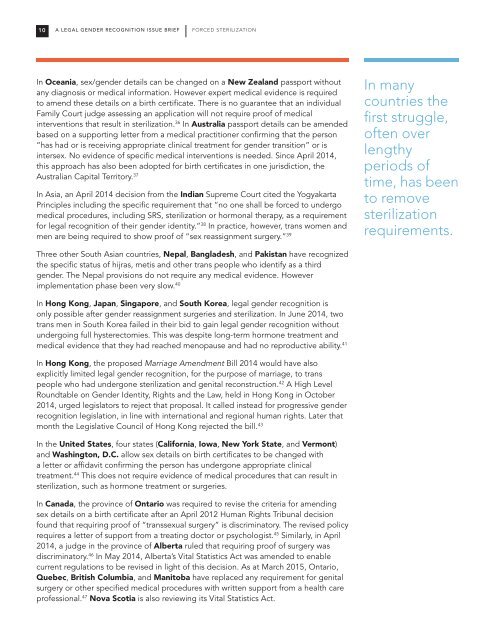FORCED STERILIZATION
lgr-forced-sterilization-20151120
lgr-forced-sterilization-20151120
You also want an ePaper? Increase the reach of your titles
YUMPU automatically turns print PDFs into web optimized ePapers that Google loves.
10<br />
A LEGAL GENDER RECOGNITION ISSUE BRIEF<br />
<strong>FORCED</strong> <strong>STERILIZATION</strong><br />
In Oceania, sex/gender details can be changed on a New Zealand passport without<br />
any diagnosis or medical information. However expert medical evidence is required<br />
to amend these details on a birth certificate. There is no guarantee that an individual<br />
Family Court judge assessing an application will not require proof of medical<br />
interventions that result in sterilization. 36 In Australia passport details can be amended<br />
based on a supporting letter from a medical practitioner confirming that the person<br />
“has had or is receiving appropriate clinical treatment for gender transition” or is<br />
intersex. No evidence of specific medical interventions is needed. Since April 2014,<br />
this approach has also been adopted for birth certificates in one jurisdiction, the<br />
Australian Capital Territory. 37<br />
In Asia, an April 2014 decision from the Indian Supreme Court cited the Yogyakarta<br />
Principles including the specific requirement that “no one shall be forced to undergo<br />
medical procedures, including SRS, sterilization or hormonal therapy, as a requirement<br />
for legal recognition of their gender identity.” 38 In practice, however, trans women and<br />
men are being required to show proof of “sex reassignment surgery.” 39<br />
In many<br />
countries the<br />
first struggle,<br />
often over<br />
lengthy<br />
periods of<br />
time, has been<br />
to remove<br />
sterilization<br />
requirements.<br />
Three other South Asian countries, Nepal, Bangladesh, and Pakistan have recognized<br />
the specific status of hijras, metis and other trans people who identify as a third<br />
gender. The Nepal provisions do not require any medical evidence. However<br />
implementation phase been very slow. 40<br />
In Hong Kong, Japan, Singapore, and South Korea, legal gender recognition is<br />
only possible after gender reassignment surgeries and sterilization. In June 2014, two<br />
trans men in South Korea failed in their bid to gain legal gender recognition without<br />
undergoing full hysterectomies. This was despite long-term hormone treatment and<br />
medical evidence that they had reached menopause and had no reproductive ability. 41<br />
In Hong Kong, the proposed Marriage Amendment Bill 2014 would have also<br />
explicitly limited legal gender recognition, for the purpose of marriage, to trans<br />
people who had undergone sterilization and genital reconstruction. 42 A High Level<br />
Roundtable on Gender Identity, Rights and the Law, held in Hong Kong in October<br />
2014, urged legislators to reject that proposal. It called instead for progressive gender<br />
recognition legislation, in line with international and regional human rights. Later that<br />
month the Legislative Council of Hong Kong rejected the bill. 43<br />
In the United States, four states (California, Iowa, New York State, and Vermont)<br />
and Washington, D.C. allow sex details on birth certificates to be changed with<br />
a letter or affidavit confirming the person has undergone appropriate clinical<br />
treatment. 44 This does not require evidence of medical procedures that can result in<br />
sterilization, such as hormone treatment or surgeries.<br />
In Canada, the province of Ontario was required to revise the criteria for amending<br />
sex details on a birth certificate after an April 2012 Human Rights Tribunal decision<br />
found that requiring proof of “transsexual surgery” is discriminatory. The revised policy<br />
requires a letter of support from a treating doctor or psychologist. 45 Similarly, in April<br />
2014, a judge in the province of Alberta ruled that requiring proof of surgery was<br />
discriminatory. 46 In May 2014, Alberta’s Vital Statistics Act was amended to enable<br />
current regulations to be revised in light of this decision. As at March 2015, Ontario,<br />
Quebec, British Columbia, and Manitoba have replaced any requirement for genital<br />
surgery or other specified medical procedures with written support from a health care<br />
professional. 47 Nova Scotia is also reviewing its Vital Statistics Act.


